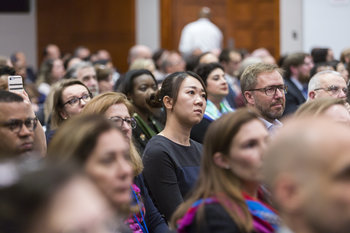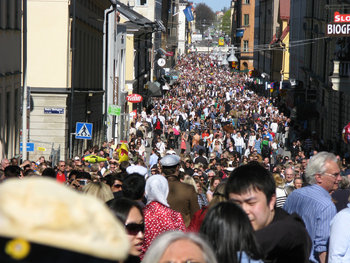|
| |
Cultural competence is the ability to socialize effectively with people who have a different cultural background from yourself. This requires foundational social skills such as reading emotion and a positive attitude that genuinely seeks communication and understanding. Cultural competence is also associated with specific techniques such as avoiding assumptions or speaking slowly where there is a language difference. Generally speaking, cultural competence improves with experience where you have the opportunity to interact with people from diverse backgrounds. The following are illustrative examples of cultural competence.
A traveler who picks up a few words of the local language to try to show some respect to the local culture.A student who avoids making assumptions about people based on how they look or elements of their identity such as ethnicity.A waiter who is empathetic when a traveler is confused by the menu and norms of local dining.A traveler who speaks slowly when using English in a non-English environment.
A government that publishes information in plain language in order to make information more broadly accessible.A textbook author who avoids cultural and lifestyle assumptions in the wording of math problems.A doctor who works to identify and defeat their own biases in dealing with patients with different backgrounds and identities.A teacher working with First Nations peoples in Canada who avidly reads about their culture.A doctor who asks questions to carefully understand each individual as opposed to making assumptions based on stereotypes or their own cultural background.A business person who is able to establish rapport with customers and partners from any nation as they are careful to try to understand each person as an individual and relate to them and their motivations, values and sense of humor.An avid traveler who has met people from countless backgrounds such that they have become skilled at communicating with gestures, facial expressions, body language, eye contact, tone of voice, drawings and basic vocabulary. An individual who is a member of multiple cultures such that they enjoy extended cultural capital. An individual who speaks Mandarin, English and Spanish well such that they can communicate to a large number of people in their native language.An academic who has read a great deal about European and Asian culture but is still careful not to make assumptions about people or to come off as obnoxious whereby they presume to know the cultures of others.An international student studying in Australia who makes friends from many countries as opposed to clinging to those with whom they share cultural capital.An Australian student who makes friends with international students and works to engage them in local culture and community.An American who has lived in Japan for 10 years who is patient and emotionally unaffected when locals make inaccurate assumptions or try to undermine them with insincere praise.An individual who is happy to explain when another person is genuinely curious about their culture.A business that regularly trains employees in cultural competence whereby employees study key cultural differences such as collectivism vs individualism and case studies that give them greater understanding of various cultures.CounterexamplesA tourist who speaks quickly in English in France and gets annoyed when people don't understand or are "rude" in response.
Causing people to lose face in a culture where this is against the norm.
Explaining things with obscure cultural references such that only people with a similar background as yourself are likely to understand.
Being hostile to people speaking your language because you are impatient with their accent.
Assuming a customer can't speak the local language based on their race.
Trying to convey how much you know about another person's culture whereby you come off as presumptuous and boorish.
An individual who makes assumptions about someone based on their culture.
Applying or stating stereotypes and biases based on culture.
Being insensitive or unaware of differences between culture that are relevant to your profession. For example, a doctor who is unaware that a culture commonly consumes an herb that can interaction with a medication in a dangerous way.
Communicating in a way that is considered hostile, mocking or generally insulting or discriminatory. For example, complimenting someone on how well they fit into local culture when they have lived their their entire life or for a very long time.
Avoiding people from diverse cultures. In most cases, this would qualify as discrimination.
Adoption of an us vs them view of other cultures such that you are prone to being hostile or unfair.
Using unnecessarily complex language.
Trying to sideline someone in a meeting because of their culture, nationality, ethnicity or background.
Being defensive about your culture such that you interpret any mention of it as hostile.
Easily becoming self-righteous and angry when someone makes an incorrect assumption about you.
Failing to treat people as unique individuals when they are from a different culture than yourself.
Being a know-it-all about someone else's culture.
Generally failing to have a positive attitude towards someone based on their culture. For example, assuming someone is an annoying tourist based on their nationality.
NotesThere are a large number of cultures such that cultural competence is an extremely broad and ambiguous knowledge area. As such, it tends to rely on foundational principles such as having a kind attitude towards people and treating people as individuals.Cultural competence requires reliance and understanding whereby mistakes can be corrected but are quickly forgiven. For example, an American in Europe who doesn't become hostile when someone stereotypes them but rather points out that all Americans aren't the same person.|
Type | | Definition | The ability to socialize effectively with people who have a different cultural background from yourself. | Also Known As | | Related Concepts | |
Cultural Diversity
This is the complete list of articles we have written about cultural diversity.
If you enjoyed this page, please consider bookmarking Simplicable.
© 2010-2023 Simplicable. All Rights Reserved. Reproduction of materials found on this site, in any form, without explicit permission is prohibited.
View credits & copyrights or citation information for this page.
|



































